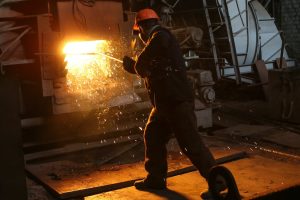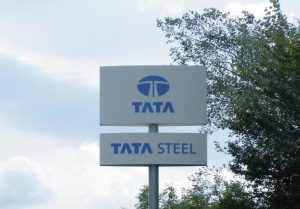Steel plant in Port Talbot to face job losses as Indian owners shift to greener steel manufacturing
Tata Steel plans to lay off around 2,800 workers as part of a major restructuring of its UK operations, dealing a blow to an industry that was once one of the country’s largest.
The company’s Indian owners told trade union leaders on Thursday they plan to close two blast furnaces at the Port Talbot plant in South Wales, the UK’s largest steelworks, by the end of this year.
The planned move, reported by the Financial Times on Wednesday, forms part of a four-year transition to greener forms of steelmaking at Tata’s UK steel operations, which employ 8,000 people, and include sites elsewhere in Wales and the Midlands.
Tata will invest £750mn to finance the restructuring, which will be supported by a £500mn grant from the British government.

Tata’s announcement of the restructuring comes after a key meeting between company executives and union leaders in London on Thursday over the future of Port Talbot, which is expected to bear the brunt of 2,800 redundancies.
The job losses are going to be a huge blow to South Wales – Port Talbot is the largest private employer in the UK.
Tata’s management rejected unions’ plan to keep a blast furnace at Port Talbot open until 2032 to reduce the scale of layoffs, stating that the business was losing around £1 million a day.
This would cost an additional £650mn, according to people familiar with the situation.
Port Talbot’s blast furnace is used in primary steelmaking, converting iron ore into molten iron which is then made into steel.
Tata plans to replace them with an electric arc furnace, which continues to use a less labor-intensive process to make steel from scrap.
The destruction of the Port Talbot blast furnace will leave two furnaces remaining in Britain, both of which belong to British Steel.
However, the Chinese-owned company said in November that it had long planned to close its Lincolnshire furnaces and replace them with two electric arc facilities, which are due to become operational as early as 2025.
Without the blast furnaces of both companies, the UK would be the only major economy that appears unable to make steel from scratch.
Tata accepted one of the unions’ proposals, which was to keep Port Talbot’s hot strip mill open for at least a transition period for processing imported semi-finished steel or slabs. About 200 jobs will be protected by this.
Company officials are trying to minimize the impact of the restructuring on the workforce, pointing out that many of the people facing redundancies will be relatively close to retirement.
But union leaders have expressed a sharp reaction. Charlotte Brumpton-Childs, a national official of the GMB union, said, “Massive job losses are going to be a huge blow to UK manufacturing and Port Talbot.”
“It doesn’t have to be this way – unions have provided a realistic, cost-effective alternative that would potentially rule out all compulsory redundancies.”
The government also pointed to a £500 million grant to help restructure Tata Steel’s operations, saying this would help protect thousands of jobs and ensure a “competitive future” and sustainable for the country’s steel industry. will be.
“Engagement with trade unions will be a truly company-led process,” it says. “There is a wide range of support in place for affected employees, including a dedicated transition board supported by £20 million from Tata Steel and £80 million from the UK Government.”
It says the transition board will be on hand to support affected workers and the local economy and will be chaired by Welsh Secretary David Davis.
Labor MP, Stephen Kinnock, whose Aberavon constituency includes Port Talbot, had urged Tata to “reconsider” its approach.
Tata Steel, part of the Tata Group, has been a major employer in the UK with businesses ranging from Jaguar Land Rover to Tetley Tea.

TATA STEEL
https://news24uk.com/
